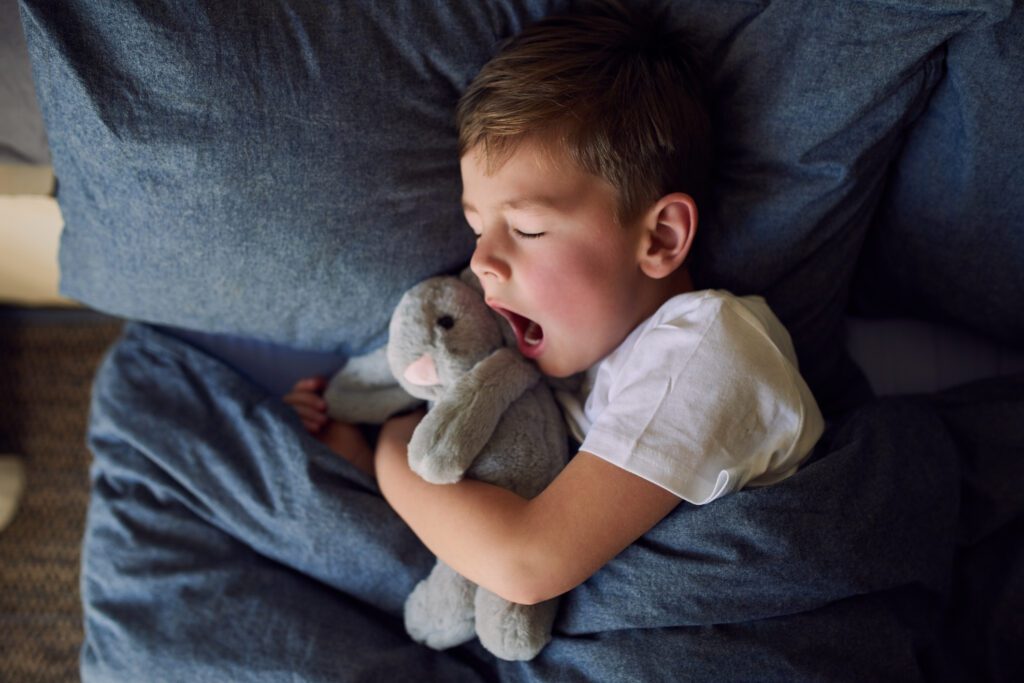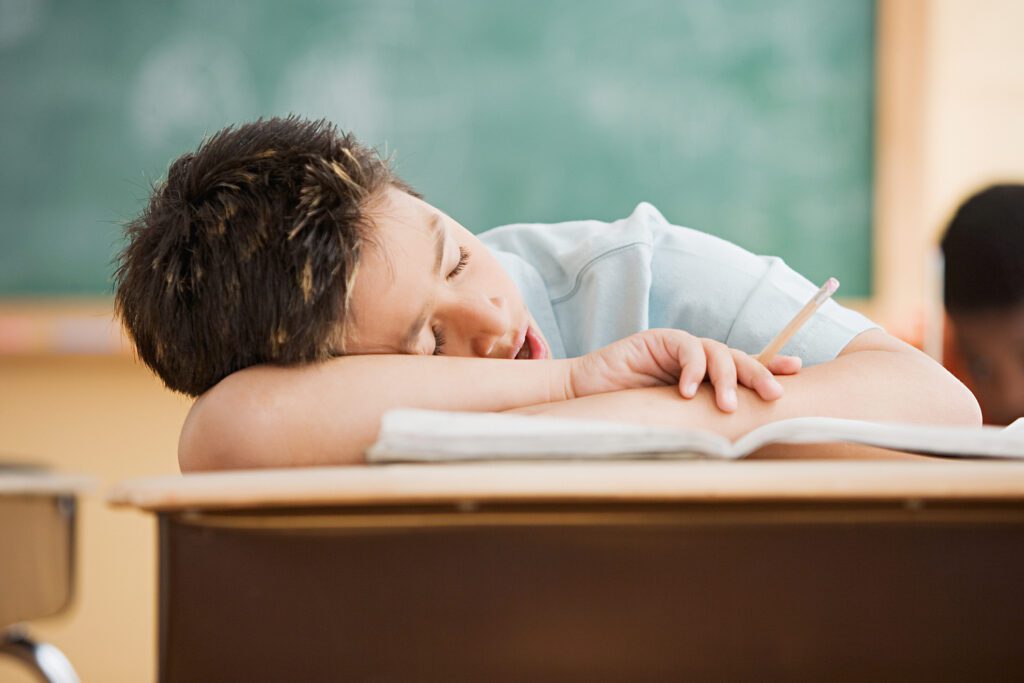Sleep disorders, including sleep apnea, can occur in patients of any age, even young children. Sleep apnea in children is one of the pediatric dental services we provide to the public in Worcester, MA. Genetics, weight, sleep posture, medications, and nasal or sinus issues can contribute to sleep apnea.
Snoring and sleep apnea can disrupt sleep and reduce the oxygen that reaches the brain. This can negatively impact health as well as the quality of life. For young children and teens, it can impact their ability to perform at their best in school and their endurance when participating in sports.
Common sleep disorders amongst children include snoring, teeth clenching and grinding (bruxism), Upper Airway Resistance Syndrome (UARS), and Obstructive sleep apnea (OSA).
Obstructive sleep apnea occurs when soft tissues in the airway collapse, blocking the airway. Patients with sleep apnea can experience pauses in breathing tens to hundreds of times at night.
It’s estimated that between 5%-10% of children have OSA. Unfortunately, OSA is often misdiagnosed as ADHD. Up to 25% of children diagnosed with and treated for ADHD may not actually have those conditions. Instead, they may have a sleep disorder.
Our dental office works with pediatricians and provides children’s sleep appliances to provide the proper diagnosis, reduce sleep apnea symptoms, and improve your child’s development in our Worcester, MA pediatric dental office.

How Lack of Sleep Impacts Your Child’s Development
Infants need about 15 hours of sleep per night. As children grow older, their sleep needs will lessen, but they still need between eight and 12 hours per night, depending on their age and activity level.
Sleep allows the body to repair, grow, and re-energize. Without proper sleep, the body and brain won’t function optimally. If a child experiences sleep deprivation, they can experience mood swings and lowered immune response. Growth hormones are also released during sleep, so less sleep can stunt their growth.
Disturbances in sleep can lead to long-term, serious problems with dental and general health. Such problems include:
- Increased risk of obesity
- High blood pressure and heart disease
- Increased risk of cognitive problems
Dental problems related to OSA and bruxism can also include:
- Dental malocclusion
- Crowded teeth
- Speech problems
- Problems with oral hygiene due to tooth positioning
- Swallowing disorders
Symptoms of a Sleep Disorder
Not sure if your child struggles with a sleep disorder? Here are some signs to watch out for. If your child has any of these, they may benefit from pediatric dental sleep services.
- Not sleeping or restless sleep
- Waking up tired
- Feeling chronically exhausted
- Mood swings
- Snoring or noisy breathing
- Pauses in their breathing at night
- Coughing or choking at night
- Mouth breathing
- Bedwetting
- Night terrors
- Difficulty concentrating and learning issues
- Complaints of headaches or jaw/facial pain
Children’s Sleep Appliances in Worcester, MA
When your child is dealing with sleep issues, you should take them first to their pediatrician. A pediatrician can provide diagnostic tests, including a sleep study, to provide valuable information about symptoms and sleeping patterns. We can work hand-in-hand with your child’s doctor to determine the right treatment for sleep apnea.
One of the most effective options for young patients is a sleep appliance or oral appliance. A sleep appliance resembles a nightguard because it covers the upper and lower teeth. Different oral appliances can address multiple problems at once. While all appliances keep the airway open, they can also hold the jaws in position, prevent nasal breathing, and encourage jaw growth.
Our office also provides NightLase, a dental laser treatment that helps pediatric sleep apnea patients. NightLase uses heat to tighten the tissues in the airway. NightLase and oral appliances both help keep the airway open and prevent disturbances in your child’s sleep.

How Does NightLase Work?
NightLase uses a safe, pain-free Er:YAG laser light that gently heats and tightens the tissues in the throat and airway. Tightening this tissue helps keep the airway open during sleep. NightLase laser treatment does not require anesthesia and can help reduce sleep apnea symptoms. NightLase requires three to four quick treatments over two months. Patients can resume normal activities after their laser treatment.
Learn More About Laser Therapy for Sleep Apnea
NightLase® FAQs
IS NIGHTLASE® SAFE?
Yes, NightLase® has been shown to be safe and effective in multiple research studies for snoring and sleep apnea treatment. It does not require special arrangements or procedures before or after the treatment.
DOES NIGHTLASE® HURT?
No, NightLase® does not hurt. It doesn’t require any anesthesia!
DOES NIGHTLASE® REALLY WORK?
Yes, NightLase® has been clinically proven via comprehensive scientific research to reduce snoring and obstructive sleep apnea.
Improve Your Child’s Sleep
If your child has trouble paying attention in class or is excessively tired during the day, they could have sleep apnea. Moodiness and irritability can also be signs that their sleep is not sufficient. We can also recommend a sleep center to help determine if patients have sleep apnea and require treatment. Treating a sleep disorder early on will improve your child’s ability to grow and thrive.
At Children’s Dental Specialties, we’re here to help your child get a better night’s sleep. Contact our office at (508) 625-5534 or request a dental consultation online.
